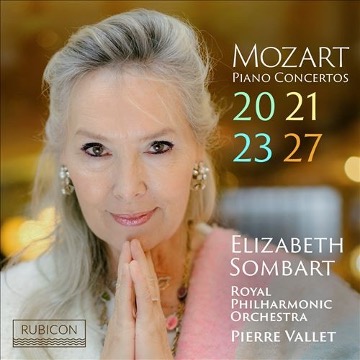MOZART PIANO CONCERTOS NOS 20, 21, 23 & 27 – ELIZABETH SOMBART
Mozart’s Timeless Brilliance: Elizabeth Sombart’s Refined Interpretation of Piano Concertos Nos 20, 21, 23 & 27
Sarah Dunlop, May 2023
In the realm of classical music, some performances stand as beacons of tradition, drawing listeners back to the timeless elegance of a bygone era. Elizabeth Sombart’s double album featuring Mozart’s Piano Concertos Nos 20, 21, 23 & 27, accompanied by the Royal Philharmonic Orchestra under the baton of conductor Pierre Vallet, may not shatter the boundaries of innovation, but it captivates with its exquisite refinement and a commitment to an almost-vanished style.
The orchestral landscape presented on this album may harken back to the sonorous textures of yesteryears, but this very essence is what makes it exceptional in the modern panorama. The sound, reminiscent of a period from decades past, is a refreshing departure from the contemporary. Recorded within the splendid acoustics of Henry Wood Hall, this release boasts a rich and expansive sonic experience that envelops the listener in a sonorous embrace.
What truly sets this recording apart is the remarkable synergy between Elizabeth Sombart and Pierre Vallet. The intricacies of Mozart’s music require a delicate balance between the piano soloist and the orchestra, and Sombart and Vallet achieve this with finesse. In particular, their collaborative artistry shines brilliantly in the initial transitions of the opening movements, where the piano establishes its world while engaging in a playful dialogue with the orchestra. A striking example is found in the enchanting transformation from tutti to solo in the Piano Concerto No. 21 in C major, K. 467, which unfurls with a captivating grace.
Sombart’s interpretation of Mozart’s compositions is marked by a certain restraint, a departure from the more sentimental approaches often found in these works. In the introspective Piano Concerto No. 27 in B flat major, K. 595, her rendering remains admirably straightforward, avoiding unnecessary embellishments and allowing the music’s inherent beauty to shine through. Similarly, in the Piano Concerto No. 20 in D minor, K. 466, Sombart’s interpretation sidesteps the shadow of Beethoven that sometimes looms over this piece, creating a refreshing and engaging perspective.
While some might yearn for a more impassioned and emotionally charged performance, Sombart’s choices are well-justified and in harmony with the prevailing trend toward a more authentic presentation of Mozart’s music. This approach dispenses with Romantic excesses and brings the listener closer to the composer’s original intentions.
Elizabeth Sombart’s double album of Mozart’s Piano Concertos may not venture into uncharted territories, but its inherent charm and impeccable musicianship offer a captivating glimpse into a refined interpretation of Mozart’s genius. This recording is a testament to the enduring allure of traditional performances and will undoubtedly find favor among those seeking an authentic and vibrant encounter with the timeless beauty of Mozart’s piano concertos.

